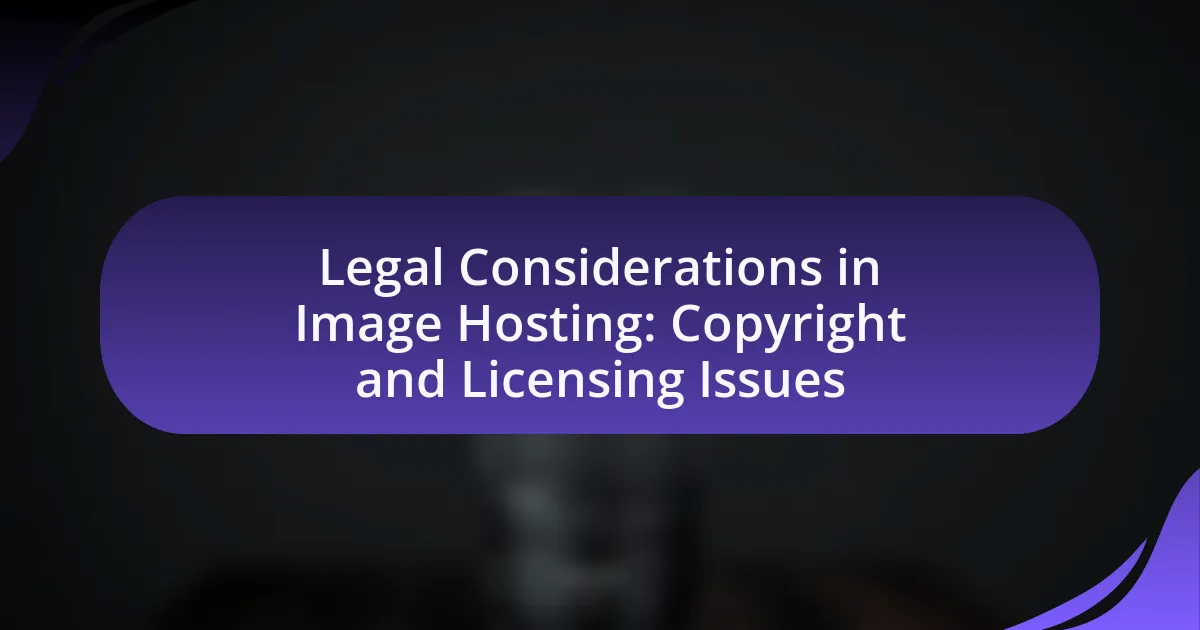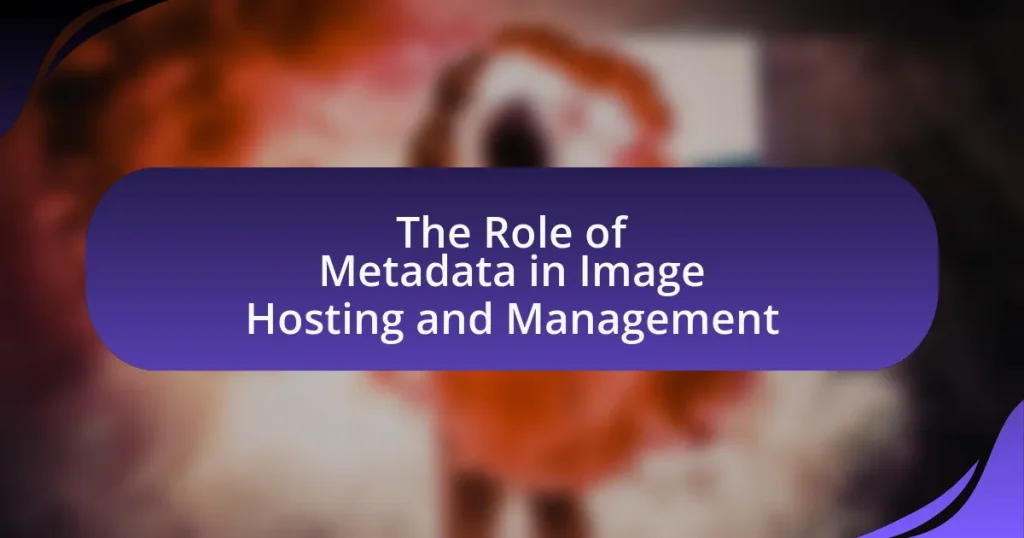The article focuses on the legal considerations in image hosting, specifically addressing copyright and licensing issues. It outlines the importance of copyright in protecting creators’ rights and the implications of the Digital Millennium Copyright Act (DMCA) for image hosting platforms. Key topics include the principles of copyright law, types of licenses relevant to image hosting, potential legal risks, and best practices for compliance. The article emphasizes the responsibilities of image hosts in managing user-generated content and provides practical tips for users to navigate copyright and licensing effectively.
What are the Legal Considerations in Image Hosting?
Legal considerations in image hosting primarily involve copyright and licensing issues. Image hosts must ensure that they have the right to display images, which typically requires obtaining permission from the copyright holder or using images that are in the public domain or licensed under terms that allow for such use. Failure to comply with copyright laws can result in legal action, including takedown notices under the Digital Millennium Copyright Act (DMCA) in the United States. Additionally, image hosting services must implement policies to address user-uploaded content, ensuring that they respond promptly to infringement claims and maintain a system for users to report violations.
Why is copyright important in image hosting?
Copyright is important in image hosting because it protects the rights of creators and ensures that their work is not used without permission. This legal framework allows artists and photographers to control how their images are distributed and monetized, thereby incentivizing creativity and innovation. According to the U.S. Copyright Office, copyright grants the creator exclusive rights to reproduce, distribute, and display their work, which is essential for maintaining the integrity of the creative industry. Without copyright protection, image hosting platforms could face legal liabilities for hosting unauthorized content, leading to potential lawsuits and financial losses.
What are the basic principles of copyright law?
The basic principles of copyright law include the protection of original works of authorship, the exclusive rights granted to creators, and the limitation of those rights to a specific duration. Copyright law safeguards the expression of ideas, not the ideas themselves, ensuring that creators have the exclusive right to reproduce, distribute, and display their works. This legal framework is established under the Copyright Act of 1976 in the United States, which provides protection for a duration of the creator’s life plus 70 years. These principles are designed to encourage creativity and innovation by granting authors control over their works while also allowing for certain exceptions, such as fair use, which permits limited use of copyrighted material without permission under specific circumstances.
How does copyright apply to digital images?
Copyright applies to digital images by granting the creator exclusive rights to reproduce, distribute, and display their work. This legal protection arises automatically upon the creation of the image, as established by the Copyright Act of 1976 in the United States, which recognizes original works of authorship, including visual art, as copyrightable. The creator retains these rights unless they transfer them through licensing or assignment, ensuring that unauthorized use, such as copying or sharing without permission, constitutes copyright infringement. This framework is supported by numerous court cases that have upheld the rights of image creators against unauthorized use, reinforcing the importance of copyright in protecting digital images.
What types of licenses are relevant for image hosting?
The types of licenses relevant for image hosting include Creative Commons licenses, proprietary licenses, and public domain licenses. Creative Commons licenses allow creators to specify how their images can be used, ranging from full rights reserved to various levels of sharing and adaptation. Proprietary licenses grant specific rights to users under defined conditions, often requiring payment or attribution. Public domain licenses enable images to be freely used without restrictions, as the creator has relinquished all rights. These licensing types are essential for ensuring compliance with copyright laws and protecting the rights of image creators while allowing users to understand how they can legally use the images.
What are the differences between exclusive and non-exclusive licenses?
Exclusive licenses grant the licensee sole rights to use the licensed material, meaning the licensor cannot grant the same rights to others, while non-exclusive licenses allow multiple licensees to use the same material simultaneously. In an exclusive license, the licensee typically has greater control and can prevent others from using the material, which can enhance its value, whereas a non-exclusive license is often less expensive and allows for broader distribution of the material. This distinction is crucial in copyright law, as it affects the rights and obligations of both licensors and licensees in the context of image hosting and usage.
How do Creative Commons licenses work?
Creative Commons licenses allow creators to grant specific usage rights to their works while retaining other rights. These licenses provide a standardized way for creators to communicate which rights they reserve and which rights they waive for the public, facilitating sharing and collaboration. There are several types of Creative Commons licenses, each with different conditions, such as attribution, non-commercial use, and share-alike requirements, which dictate how others can use the licensed material. For example, the Attribution license allows others to use the work as long as they credit the creator, while the Non-Commercial license restricts use to non-commercial purposes only. This framework helps to clarify the legal use of creative works in various contexts, including image hosting, by providing clear guidelines on how images can be shared and reused.
What are the potential legal risks in image hosting?
The potential legal risks in image hosting primarily include copyright infringement, liability for user-generated content, and violations of privacy rights. Copyright infringement occurs when hosted images are used without proper authorization from the copyright holder, which can lead to lawsuits and financial penalties. Liability for user-generated content arises when a hosting platform is held responsible for illegal or infringing material uploaded by users, especially if the platform fails to act upon receiving notice of such content, as established by the Digital Millennium Copyright Act (DMCA). Violations of privacy rights can occur if images are hosted without consent from individuals depicted, potentially resulting in legal claims for invasion of privacy or defamation. These risks highlight the importance of implementing robust copyright policies, monitoring content, and obtaining necessary permissions to mitigate legal exposure.
What constitutes copyright infringement in image hosting?
Copyright infringement in image hosting occurs when an image is used, reproduced, or distributed without the permission of the copyright holder. This includes uploading copyrighted images to an image hosting platform without authorization, sharing links to such images, or using them in a manner that violates the terms of the copyright. The U.S. Copyright Act provides that the owner of a copyright has exclusive rights to reproduce, distribute, and display their work, and unauthorized use can lead to legal consequences.
How can image hosts protect themselves from legal liability?
Image hosts can protect themselves from legal liability by implementing a robust copyright policy and utilizing the Digital Millennium Copyright Act (DMCA) safe harbor provisions. By establishing clear guidelines for user-generated content, image hosts can ensure that they promptly respond to copyright infringement claims and remove infringing material when notified. This proactive approach not only minimizes legal risks but also demonstrates compliance with copyright laws, as outlined in the DMCA, which provides a legal framework for addressing copyright issues online. Additionally, image hosts should maintain detailed records of user agreements and content submissions to further safeguard against potential legal challenges.
How do Copyright and Licensing Issues Affect Image Hosting Platforms?
Copyright and licensing issues significantly impact image hosting platforms by imposing legal responsibilities for the content they host. These platforms must ensure that the images uploaded by users do not infringe on copyright laws, which protect the rights of creators. Failure to comply can result in legal actions, including takedown notices under the Digital Millennium Copyright Act (DMCA), which mandates that platforms remove infringing content upon notification. Additionally, image hosting services often implement licensing agreements to clarify the usage rights of images, which can affect how users share and monetize their content. For instance, platforms like Flickr and Shutterstock have specific licensing terms that dictate how images can be used, ensuring that both the platform and the content creators are protected legally.
What responsibilities do image hosting platforms have regarding copyright?
Image hosting platforms have the responsibility to ensure that they do not infringe on copyright laws by allowing users to upload and share copyrighted images without permission. These platforms must implement measures to monitor and remove infringing content when notified, as outlined in the Digital Millennium Copyright Act (DMCA). The DMCA provides a safe harbor provision, which protects platforms from liability for user-uploaded content, provided they act promptly to remove infringing material upon receiving a valid takedown notice. Failure to comply with these responsibilities can result in legal consequences, including potential lawsuits from copyright holders.
How can platforms ensure compliance with copyright laws?
Platforms can ensure compliance with copyright laws by implementing robust content management systems that include automated copyright detection tools. These systems can scan uploaded content for copyrighted material, flagging or removing it as necessary to prevent infringement. Additionally, platforms should establish clear user agreements that outline copyright responsibilities and provide educational resources about copyright laws to users. Regular audits and updates to these systems, along with cooperation with copyright holders, further enhance compliance efforts.
What are the implications of the Digital Millennium Copyright Act (DMCA)?
The implications of the Digital Millennium Copyright Act (DMCA) include the establishment of a framework for copyright protection in the digital environment, which significantly impacts how online content is shared and managed. The DMCA provides safe harbor provisions that protect internet service providers and platforms from liability for user-generated content, as long as they comply with takedown requests from copyright holders. This law also criminalizes the circumvention of digital rights management (DRM) technologies, reinforcing the protection of copyrighted works. The DMCA has led to increased enforcement of copyright claims, resulting in both positive and negative consequences for content creators and users, including the potential for abuse of the takedown process.
How do licensing agreements impact users of image hosting services?
Licensing agreements significantly impact users of image hosting services by defining the rights and restrictions associated with the use of images. These agreements dictate how users can legally utilize, share, or modify images, ensuring compliance with copyright laws. For instance, a user may be restricted from using an image for commercial purposes unless explicitly permitted by the licensing terms. Additionally, licensing agreements often specify attribution requirements, which users must follow to avoid legal repercussions. This framework protects the intellectual property of creators while guiding users on permissible actions, thereby influencing their engagement with the hosted content.
What should users look for in licensing agreements?
Users should look for clarity on the scope of use in licensing agreements. This includes understanding the specific rights granted, such as whether the license is exclusive or non-exclusive, the duration of the license, and any geographical limitations. Additionally, users should verify the terms regarding modifications, distribution, and attribution requirements. Clear definitions of these elements help prevent legal disputes and ensure compliance with copyright laws.
How can users avoid copyright violations when using hosted images?
Users can avoid copyright violations when using hosted images by ensuring they have the appropriate rights or licenses for the images they intend to use. This includes utilizing images that are in the public domain, licensed under Creative Commons, or purchased from stock photo websites that grant usage rights. Additionally, users should always credit the original creator when required and verify the licensing terms to ensure compliance with copyright laws. According to the U.S. Copyright Office, unauthorized use of copyrighted images can lead to legal repercussions, emphasizing the importance of understanding and adhering to copyright regulations.
What Best Practices Should Be Followed in Image Hosting?
Best practices in image hosting include ensuring compliance with copyright laws, using proper licensing, and implementing secure storage solutions. Compliance with copyright laws is crucial, as unauthorized use of images can lead to legal repercussions; for instance, the U.S. Copyright Office states that copyright protection applies to original works of authorship fixed in a tangible medium. Proper licensing, such as Creative Commons licenses, allows for legal sharing and use of images while respecting the rights of the original creators. Additionally, secure storage solutions protect images from unauthorized access and potential theft, which is essential for maintaining the integrity of the hosted content.
How can image hosts implement effective copyright policies?
Image hosts can implement effective copyright policies by establishing clear guidelines for user-generated content, utilizing automated tools for copyright detection, and providing a straightforward process for copyright claims. Clear guidelines inform users about acceptable content and the consequences of infringement, while automated tools, such as content recognition software, help identify copyrighted material before it is uploaded. Additionally, a transparent claims process allows copyright holders to report infringements easily, ensuring prompt action and compliance with copyright laws. These measures collectively enhance the protection of intellectual property rights and reduce legal risks for image hosting platforms.
What steps can be taken to educate users about copyright issues?
To educate users about copyright issues, organizations can implement comprehensive training programs that cover the fundamentals of copyright law, including the rights of creators and the implications of infringement. These programs should include interactive workshops, online courses, and easily accessible resources that explain copyright concepts in clear language. Additionally, providing real-world examples of copyright violations and their consequences can enhance understanding. Research indicates that educational initiatives significantly improve awareness; for instance, a study by the U.S. Copyright Office found that targeted educational efforts led to a 30% increase in users’ understanding of copyright laws.
How can image hosts monitor and enforce copyright compliance?
Image hosts can monitor and enforce copyright compliance by implementing automated content recognition technologies and establishing clear reporting mechanisms for copyright infringement. Automated systems, such as digital fingerprinting and watermarking, allow image hosts to identify copyrighted material uploaded to their platforms, enabling them to take action against unauthorized use. Additionally, image hosts often provide users with tools to report suspected copyright violations, which can lead to prompt investigations and potential removal of infringing content. These practices are supported by legal frameworks like the Digital Millennium Copyright Act (DMCA), which outlines the responsibilities of online service providers in managing copyright issues.
What are the common pitfalls to avoid in image hosting?
Common pitfalls to avoid in image hosting include failing to secure proper licensing for images, neglecting copyright laws, and not implementing adequate security measures. Securing proper licensing is crucial because using images without permission can lead to legal disputes and financial penalties. Neglecting copyright laws can result in unauthorized use of copyrighted material, which is a violation that can incur significant legal consequences. Additionally, not implementing adequate security measures can expose hosted images to unauthorized access or theft, compromising both the integrity of the images and the privacy of users.
What mistakes lead to copyright infringement in image hosting?
Mistakes that lead to copyright infringement in image hosting include using images without proper licensing, failing to attribute the original creator, and hosting images that are not owned or authorized for use. These actions violate copyright laws, which protect the rights of creators. For instance, according to the U.S. Copyright Office, unauthorized use of copyrighted images can result in legal action and financial penalties. Additionally, many image hosting platforms have strict policies against copyright infringement, and violating these can lead to account suspension or removal of content.
How can image hosts mitigate risks associated with user-generated content?
Image hosts can mitigate risks associated with user-generated content by implementing robust content moderation policies and utilizing automated filtering technologies. These measures help identify and remove inappropriate or infringing content before it can cause legal issues. For instance, platforms like YouTube and Facebook employ advanced algorithms to detect copyright violations and harmful material, significantly reducing their liability under laws such as the Digital Millennium Copyright Act (DMCA). Additionally, image hosts can establish clear user agreements that outline acceptable content guidelines and the consequences of violations, further protecting themselves legally.
What practical tips can help users navigate copyright and licensing issues?
To navigate copyright and licensing issues effectively, users should always verify the copyright status of any image before use. This involves checking whether the image is in the public domain, licensed under Creative Commons, or protected by copyright. Users can utilize resources like the U.S. Copyright Office and Creative Commons’ website to understand the specific licensing terms associated with an image. Additionally, obtaining explicit permission from the copyright holder is crucial when using copyrighted material. Keeping records of permissions and licenses can also help in case of disputes. Following these steps ensures compliance with copyright laws and minimizes the risk of legal issues.



